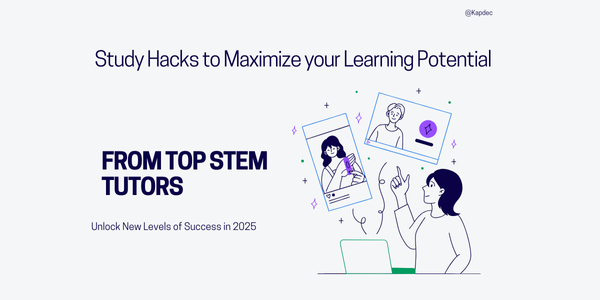
As high school or early college students, you are often juggling multiple subjects, assignments, and exams. Among the most challenging of these are STEM (Science, Technology, Engineering, and Mathematics) subjects, which require deep understanding, critical thinking, and problem-solving skills. Whether you’re grappling with calculus, struggling to understand chemistry, or aiming to excel in physics, the road to mastering STEM subjects can seem daunting.
However, with the right strategies and study techniques, you can unlock your learning potential and tackle STEM subjects with confidence. Top tutors and educators have honed effective study hacks that can help you streamline your learning process, retain information better, and ultimately improve your performance.
In this article,, we’ll explore some of the best study hacks used by top tutors to help high school and early college students maximize their learning potential in STEM subjects.
Table of Contents:
1. Master the Basics Before Diving into Complex Topics
One of the most common mistakes students make in STEM subjects is rushing into complex topics without mastering the foundational concepts. Whether you’re learning calculus or organic chemistry, understanding the core principles is key to grasping more advanced ideas. Ask your tutors, more questions as you attend lectures to get to basics. Kapdec tutors are expert in such strategies.
Study Hack: Start with the basics. For example, before tackling differential equations, ensure that you understand algebra and functions thoroughly. In chemistry, be sure you understand atomic structure and chemical bonding before jumping into reaction mechanisms. Build your knowledge layer by layer—this will help you connect the dots as you progress to more advanced material.
2. Use Active Learning Techniques
Passive reading or listening during lectures often leads to shallow learning, especially in STEM subjects that require critical thinking and problem-solving. Active learning, on the other hand, engages you more deeply in the material and enhances retention. Students taking classes from Tutors at Kapdec portal are frequently challenged through quizzes or questions-answers integrated with in the discussions during class to promote active learning.
Study Hack: Practice, don’t just read. In math and physics, solving problems is the best way to internalize concepts. Instead of reading through textbooks or watching tutorials passively, try solving problems on your own first. Once you hit a roadblock, refer to your textbook or ask a tutor for guidance. In subjects like chemistry, engage with the material by doing hands-on experiments or visualizing chemical reactions to deepen your understanding.
3. Utilize Spaced Repetition for Long-Term Retention
Simply cramming the night before an exam is not the most effective way to retain information, especially in STEM subjects where understanding builds upon previous knowledge. Spaced repetition is a learning technique where you review material at increasing intervals over time, which strengthens your memory and prevents forgetting.
Study Hack: Leverage flashcards to implement spaced repetition. Write down key formulas, concepts, create short summaries for yourself, create a summary of summary – eventually boiling down to one page. Review them periodically. For instance, in physics, you can create flashcards for important equations (like Newton’s laws or the laws of thermodynamics) and review them every few days. This technique ensures that you don’t just memorize information temporarily, but internalize it for long-term use.
4. Break Down Problems into Smaller, Manageable Steps
STEM subjects often require solving complex problems that can seem overwhelming at first glance. If you approach these problems all at once, you might feel lost or frustrated. The key is to break them down into smaller steps. It is only available at Kapdec. After students have attempted on a question and get it wrong, then look for the detailed solution techniques for each question.
Study Hack: Chunk your problems into smaller pieces. For example, in a calculus problem, you might start by identifying the function you’re working with, then differentiate or integrate step-by-step. In chemistry, start with identifying reactants, then balance the equation, and finally analyze the products. Tackling problems in manageable steps makes them feel less intimidating and helps you understand the underlying process.
5. Teach What You’ve Learned
One of the most effective ways to reinforce what you’ve learned is by teaching it to someone else. This method not only helps solidify your understanding but also highlights areas where you may still be unclear. This is by default the most effective technique.
Study Hack: Explain concepts to a peer or tutor. If you can teach a concept to someone else—whether it’s explaining the laws of motion in physics or teaching the process of cellular respiration in biology—it means you truly understand the material. Find a study buddy or a tutor, and take turns teaching each other. If you don’t have someone to teach, try explaining the concept aloud to yourself or writing it down as if you were creating a study guide for someone else. Students, who have mastered a subject frequently teach other students. It is one amongst many reasons that students love to join Kapdec as they also get to teach others and earn money along the way.
You only understand well enough, if you can teach someone!
6. Visualize Complex Concepts
STEM subjects, especially in fields like chemistry and physics, often involve abstract concepts that can be hard to visualize. Whether it’s understanding molecular structures, visualizing mathematical graphs, or imagining the behavior of physical forces, creating mental images can significantly boost comprehension.
Study Hack: Use diagrams, charts, or mind maps. In chemistry, draw molecular structures to better understand bonding and reactions. In physics, sketch out free-body diagrams to visualize forces acting on an object. In mathematics, use graphing tools or plot functions to see the relationship between variables. These visuals can turn abstract concepts into something more tangible and easier to grasp.
7. Take Breaks and Manage Your Time Effectively
Studying for long periods without breaks can lead to burnout, fatigue, and decreased productivity. Research shows that taking regular breaks during study sessions can actually enhance focus and retention.
Study Hack: Follow the Pomodoro Technique. Set a timer for 25 minutes of focused study, followed by a 5-minute break. After completing four cycles, take a longer 20-30 minute break. This technique helps you maintain concentration and prevents mental fatigue. During breaks, engage in activities that help you recharge, such as stretching, going for a walk, or listening to music.
8. Use Online Resources and Tutors for Personalized Help
Sometimes, self-study or group study sessions aren’t enough to fully understand difficult concepts. This is where online resources and tutors come in handy. They offer personalized, one-on-one support tailored to your needs.
Study Hack: Seek help from online tutors or platforms. If you’re struggling with a specific topic, don’t hesitate to reach out to a tutor for one-on-one assistance. Online tutoring platforms provide access to experienced educators who can explain concepts in a way that’s easier for you to understand. Use these resources to clarify doubts, get feedback on assignments, and improve your understanding of challenging material.
9. Stay Consistent and Don’t Procrastinate
In STEM subjects, consistency is key. It’s easy to fall into the trap of procrastination, especially when assignments seem difficult or overwhelming. However, delaying your study sessions only increases stress and reduces the time available for comprehensive learning.
Study Hack: Create a study schedule. Plan your study sessions, breaking down what you need to study each day. Consistency helps you stay on track and avoid last-minute cramming. Allocate enough time for each subject, and be sure to review material regularly to reinforce your learning.
10. Stay Positive and Embrace Mistakes
Finally, maintaining a positive mindset is essential for success in STEM subjects. You will make mistakes along the way—everyone does. The important thing is to view these mistakes as learning opportunities rather than failures.
Study Hack: Embrace mistakes as part of the process. When you get a problem wrong, take the time to understand why and how you can improve next time. Mistakes are inevitable in any learning process, and they provide valuable insights into where you need more practice or understanding.
Conclusion
Maximizing your learning potential in STEM subjects requires a combination of the right strategies, persistence, and a growth mindset. By following the study hacks outlined above, such as mastering the basics, using active learning techniques, utilizing spaced repetition, breaking down complex problems, teaching what you’ve learned, and seeking personalized help from tutors, you’ll be on the path to mastering STEM subjects.
Remember that learning is a marathon, not a sprint.
With the right mindset and the implementation of effective study strategies, you can unlock your full potential and achieve academic success in STEM. Stay consistent, embrace challenges, and never hesitate to seek help when needed—your efforts will pay off in the long run!






